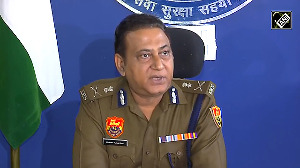By sacrificing an important component of the right to free speech, we have strengthened the hands of the fundamentalists, the bigots and the publicity-seeking goondas. And of the hate-filled political establishment, points out Vir Sanghvi.

When it comes to freedom of speech, there are some things that should be self-evident. But sadly, they are not -- at least in the current political climate. And so they may be worth repeating.
The first is that there is no Constitutional or moral right to not be offended. In fact, without the right to offend, free speech is meaningless.
If I say something and nobody minds, then I don't need my right to free speech to be protected.
Why would I need any Constitutional guarantees to be allowed to say what I want if everyone likes what I say?
And yet, in India, we fail to grasp this central fact.
Yes, people are offended all the time.
I doubt if movie stars like the abusive reviews that their performances often get.
I doubt if Mamata Banerjee was delighted when the prime minister took to taunting her with 'Didi Oh Didi' at every election rally.
I, personally, am offended every time a political leader does some communal dog-whistling: Describing people from a certain community as termites, for instance.
But all of us who are offended recognise that people have a right to say things like this. It may be horrible. But it is the price we pay for guaranteeing free speech.
Not everyone subscribes to this consensus, of course.
There have been calls for the arrest of comedian Vir Das for a brilliant but biting monologue about two Indias.
Some people have demanded action against the actress Kangana Ranaut for pouring scorn on the contributions of India's freedom fighters and claiming that the Independence we won in 1947 was just 'bheek'.
I can understand why these remarks can offend some people.
Many of Das's jokes could be seen as attacks on the ruling regime and its ideology.
In effect, Ranaut insulted Veer Savarkar, Gandhiji, Sardar Patel and thousands of others who fought for Independence.
So yes, that's even more offensive than any joke Das cracked.
But that's what free speech is about. Both Das and Ranaut have every right to their views.
Critics may say that Das should not have drawn attention to India's failings in a foreign country. (Really? In an age when everything goes on the internet and can be viewed from anywhere in the world?)
Others may argue that Ranaut sounds like a not-very-bright 12 year old with Tourette's syndrome.
And they have every right to express those opinions.
But they have no right to punish Das and Ranaut for expressing their own views.
When this principle is so firmly established in every liberal democracy, why do we have to struggle to explain it in India?
Well, some of it stems from the concerns of our founding fathers. They believed that communal peace in India was so fragile (this was right after the violence that followed Partition) that restrictions on free speech were required.
This may have made a certain amount of sense if it applied only to statements that incited violence or provoked hatred. But we seem to have expanded it to include anything at all that anyone thinks may hurt their religious feelings.
So, Aubrey Menen's retelling of the Ramayana (Rama Retold) was banned by the Nehru government. Nothing critical of Islam was allowed to be circulated.
Later this principle was extended to other religions.
As late as the 1970s, the film Jesus Christ Superstar was not allowed to be released in India.
And more recently, some states banned The DaVinci Code on the grounds that it would offend Christians.
The irony of banning films made by Christians for other Christians in largely Christian countries on the grounds that they hurt Indian Christian sentiments was lost on the authorities.
Because hardly anyone spoke out against these excesses, we intuitively accepted a bogus principle -- free speech can be curtailed if it offends people -- and nobody, not the media and not the courts, has fought back against this.
So it was okay to ban V S Naipaul's An Area of Darkness ('offends Indians'), to expel the BBC over documentaries about India made by Louis Malle and, of course, to ban The Satanic Verses.
Because of the weakness in our belief system, a whole outrage industry has developed.
Now, any publicity-hungry group can storm on to film sets, rough up the crew or threaten violence on the grounds that it is offended. Shamefully, we give in nearly every time, on the cowardly grounds that we want to keep the peace.
Sadly, Indian liberals are as much to blame as the fanatics. By sacrificing an important component of the right to free speech, we have strengthened the hands of the fundamentalists, the bigots and the publicity-seeking goondas. And of the hate-filled political establishment.
In Madhya Pradesh, a comedian can be arrested for a joke he did not crack, which, had he cracked it, might have offended Hindus.
He would have remained locked up without bail had the Supreme Court not ordered his release on a technicality.
In Odisha, a commentator can be jailed by the legislature because the MLAs were offended by remarks he made about the state.
Given that this regime appears to have no great commitment to free speech, is easily offended and does not hesitate to retaliate against those it feels have offended it (the case of Aatish Taseer is a chilling reminder of this), I doubt if things will get better.
But even while we criticise the regime's inability to take criticism, liberals should recognise that we opened the door for this erosion of our rights.
And each time we call for Ranaut's arrest, we repeat our blunder, choosing knee-jerk responses over matters of principle.
Vir Sanghvi is a journalist and TV presenter.












 © 2025
© 2025